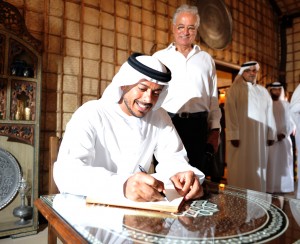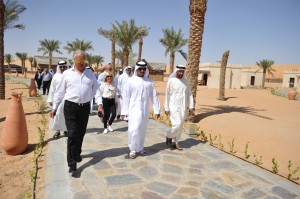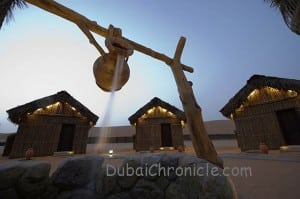‘AL BAYT BAYTAK’
 His Highness Sheikh Sultan bin Tahnoon Al Nahyan, Chairman, Abu Dhabi Tourism & Culture Authority (TCA Abu Dhabi) has officially opened the emirate’s first-of-its-kind Arabian Nights Village desert retreat, delivering a new dimension to the destination’s overall ‘culture-tourism’ proposition.
His Highness Sheikh Sultan bin Tahnoon Al Nahyan, Chairman, Abu Dhabi Tourism & Culture Authority (TCA Abu Dhabi) has officially opened the emirate’s first-of-its-kind Arabian Nights Village desert retreat, delivering a new dimension to the destination’s overall ‘culture-tourism’ proposition.
Set on a dedicated 85,000m² Al Khatem plot, the size of 12 professional football pitches, deep in Abu Dhabi’s heritage heartland, Arabian Nights Village is expected to be a leading international draw for visitors coming to the emirate.
“This is a stunning development and a sterling example of private sector initiative and investment which we hope others will emulate. The Village raises the bar on traditional overnight desert accommodation and we believe it will resonate well and be fully appreciated by residents and visitors alike,” said Sheikh Sultan.
 “I want to congratulate the owners for their attention to detail in all aspects of construction, design and interiors, as well as their f&b offering and efforts towards environmental preservation. The Village brings a whole new dimension to desert stays,” Sheikh Sultan added.
“I want to congratulate the owners for their attention to detail in all aspects of construction, design and interiors, as well as their f&b offering and efforts towards environmental preservation. The Village brings a whole new dimension to desert stays,” Sheikh Sultan added.
Operating day safaris and overnight excursions – which both include transfers to and from the Village from Abu Dhabi – the expansive resort also houses an oasis style pool, with stunning vistas of the desertscapes in the day and the unobstructed star-lit sky at night, as well as the indoor-outdoor traditional ‘Al Maqam’ restaurant, which means ‘The Gathering Place’, and a souk selling local handmade crafts.
 Conceived to give guests a chance to experience the mythical and timeless beauty of the desert and traditional Emirati life, the Arabian Nights Village boasts 30 double rooms, five 1 bedroom suites and a 3-bedroom suite, set across four distinctive themes: Bayt Al Shaaer (The Woven House), Bayt Al Bahar (House of the Sea), Bayt Al Bar (Desert Home) and Al Manhal Fort Tower.
Conceived to give guests a chance to experience the mythical and timeless beauty of the desert and traditional Emirati life, the Arabian Nights Village boasts 30 double rooms, five 1 bedroom suites and a 3-bedroom suite, set across four distinctive themes: Bayt Al Shaaer (The Woven House), Bayt Al Bahar (House of the Sea), Bayt Al Bar (Desert Home) and Al Manhal Fort Tower.
“The very tapestry of Abu Dhabi’s culture is intertwined with the desert and hospitality. In years past, any traveller who came across a desert camp was offered three days of food and shelter. This kindness formed the foundation of Abu Dhabi’s welcoming ethos, and today we open a new chapter in this story. Al baytbaytak, our home is your home,” said A. M. Simreen, Managing Partner, Arabian Nights Village.
 According to Simreen, from the moment guests arrive at the Village, they are transcended back in time, helping to set the tone for their entire stay so they immerse themselves entirely in the traditional experience.
According to Simreen, from the moment guests arrive at the Village, they are transcended back in time, helping to set the tone for their entire stay so they immerse themselves entirely in the traditional experience.
“Our unique mix of day desert safari’s and overnight excursions presents a true destination where you can enjoy a new experience while staying in rooms and suites inspired by Abu Dhabi’s rich architectural and cultural history,” said Simreen.
“As you approach the Village – which emerges surprisingly from a gigantic dune valley – you enter a picturesque courtyard overlooked by two traditional-styled watchtowers – Zakher and Al Manhal – each named after residences of the late Sheikh Zayed Bin Sultan Al Nahyan, The Father of the Nation. From here on in, guests will feel transported to a different time.
“We have worked very hard to not let modern day distractions enter the experience, so there are no TVs in the rooms, and phones and internet are operational only for emergencies.”
The jewel in Arabian Night Village’s suite offering is the Al Manhal Fort Tower, with three presidential bedrooms, each with opulent bathrooms, and lavish interiors elegantly furnished with rich fabrics, natural materials and authentic design details.
For visitors wanting to connect with other elements of Abu Dhabi history, they can stay in one of the themed rooms, where each draw on an individual theme of Emirati culture, from the beautiful weave work of Sadu, to the mud house inspired of homes of yesteryear and the emirate’s connection to its rich maritime heritage.
This experience spreads through all areas of the Village, most notably its centerpiece restaurant, Al Maqam. Recreating the bustling atmosphere of a vibrant Arabian dinner setting, guests will eat off locally made crockery, see live Arabic bread making demonstrations and be treated to a rich diversity of Emirati cuisine and culture, such as oud musicians, henna artists and falconers.
“Every step of the journey with us is designed to invoke an emotional response to allow visitors to be transported away from their daily lives to somewhere new and magical,” added Simreen.
The Village – for all its traditional practises – utilises a mix of ancient and futuristic technologies to ensure everything runs smoothly and, vitally, sustainably.
The site is powered by four sound-proofed generators and it draws on the area’s natural resources, with a specialist water treatment facility extracting and treating water on-site. Drinking water comes from a 65 metre deep well. The village also uses treated waste water to irrigate trees and its landscaped gardens.
Prices for two sharing a heritage room are Dhs1,250 (US$340) for a night inclusive of service charges and tourism fees and include breakfast and dinner and most activities. The tower suites cost Dhs3,750 (US$1,000) and holds six guests.
The village is also offering corporate packages and event hosting by a fully qualified team upon request.
A wealth of activities are also hosted on site for visitors and can be booked individually, such as dune bashing, quad biking, sand surfing and sledding, camel riding, falconry, henna painting and Emirati camel farm visits.



































